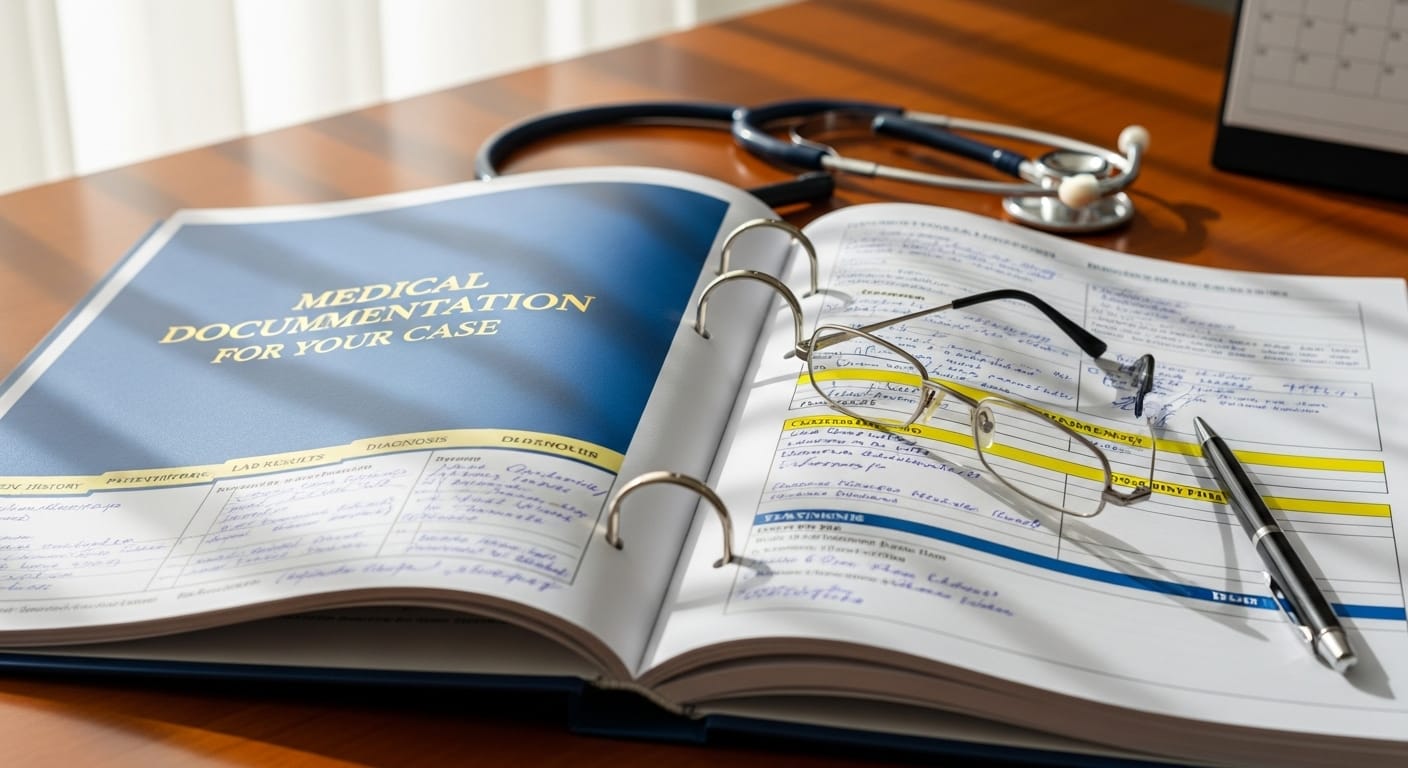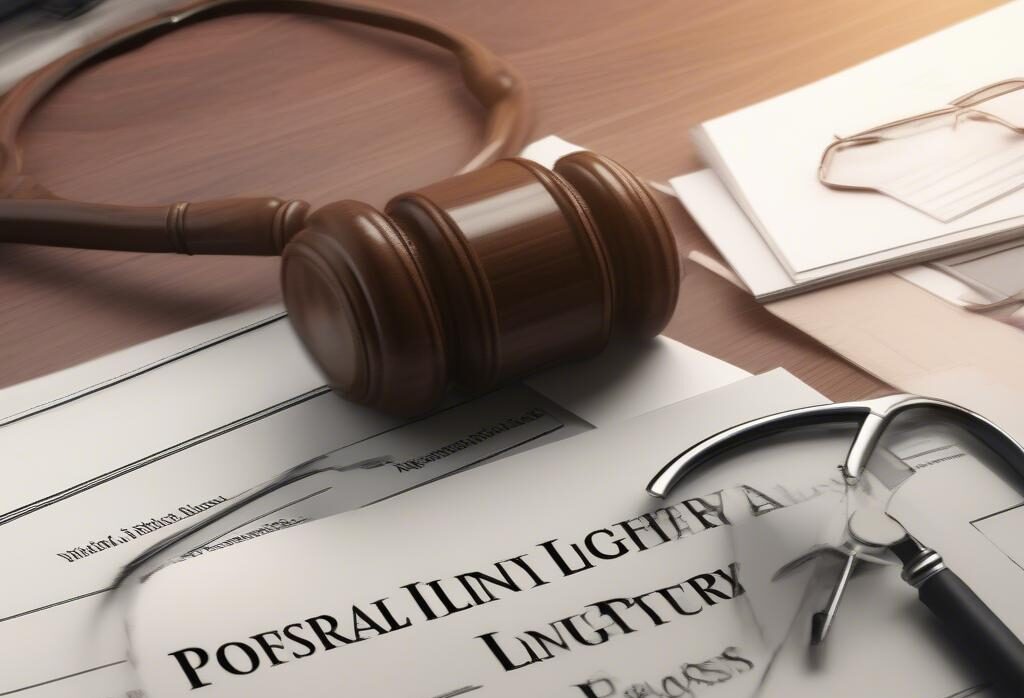So, you’ve found yourself in a bit of a pickle—a personal injury, perhaps? Maybe it was that slippery floor at the grocery store or an unfortunate encounter with a rogue bicycle.
Whatever the case, one thing is clear: if you want to make your case stronger than your Aunt Edna’s famous fruitcake, medical documentation is your best friend. Let’s dive into why keeping those medical records organized is as crucial as finding matching socks in the dryer!

Top Takeaways and Key Concepts
Prioritize Medical Documentation: Keep detailed records of diagnoses, treatments, prescriptions, and follow-ups for evidence.
Ensure Accuracy: Maintain consistent and precise records to prevent insurance or court challenges.
Collect Essential Documents: Include evaluation reports, treatment plans, progress notes, bills, and disability statements.
Avoid Common Mistakes: Attend all appointments, request copies, seek timely treatment, and communicate fully with providers.
Organize Effectively: Use folders, label clearly, update regularly, and leverage apps to track all health documents.
Summary of This Article
The article emphasizes the critical role of medical documentation in personal injury claims, showing how organized, accurate records directly affect compensation. Key documents include evaluation reports, treatment plans, progress notes, bills, and disability statements, all of which provide proof of injury, recovery, and financial impact. It warns against common mistakes such as skipping appointments, delaying treatment, and failing to keep copies. Practical tips for organization include using folders, clear labeling, regular updates, and digital tracking. Overall, meticulous documentation strengthens claims and increases the likelihood of successful legal or insurance outcomes.
What Is Medical Documentation Anyway?

First off, let’s clarify what we mean by medical documentation. It’s not just scribbles on a napkin from your doctor saying, “Yep, they’re hurt!” Nope!
We’re talking about detailed records that include everything from diagnosis and treatment plans to prescriptions and follow-up visits. Think of it as the treasure map leading straight to the gold—your compensation!
When you’re injured and considering legal action, these documents become essential pieces of evidence. They help establish not only what happened but also how it has affected your life—both physically and financially. So yes, those papers are worth their weight in gold!
Why Accurate Records Matter
You might be wondering why accuracy matters so much. Well, imagine trying to bake a cake without measuring ingredients properly—you end up with something resembling a science experiment gone wrong! Similarly, inaccurate or incomplete medical records can undermine your claim faster than you can say “settlement.”
In personal injury cases, insurance companies love to scrutinize every detail. If there’s any inconsistency between what you say happened and what’s documented in your medical files, they’ll pounce on it like my cat on an unsuspecting laser pointer dot! Keeping accurate records ensures that there’s no room for doubt when you present your case.
Types of Medical Documentation You Need
Now that we understand why documentation is important, let’s talk about what types of documents are critical for supporting your claim:
1. Initial Evaluation Reports: These are typically created during your first visit after the injury. They lay down the groundwork for understanding how serious things really are.
2. Treatment Plans: This includes details about medications prescribed and therapies recommended. It shows how actively you’re managing your recovery.
3. Progress Notes: Regular updates from healthcare providers about how you’re healing help demonstrate continuity of care.
4. Bills and Receipts: Every penny counts! Keep track of all expenses related to treatment; this will support claims for financial compensation.
5. Disability Statements: If you had to miss work due to injuries, these documents show lost wages—which could translate into cold hard cash!
By gathering all these materials diligently, you’ll have a robust arsenal ready when negotiating with insurance companies or presenting in court.
How Documentation Affects Your Compensation
Let’s see how proper documentation translates directly into money—or lack thereof! When assessing damages in personal injury cases, courts look closely at medical records because they provide tangible proof of harm suffered.
For instance, if you’ve got solid documentation showing extensive treatments due to someone else’s negligence—like multiple doctor visits or surgeries—you stand a better chance at higher compensation than if you just showed up with a crumpled receipt from last week’s aspirin purchase.
Conversely, if there are gaps in treatment or missing information about injuries sustained? You guessed it—insurance adjusters will use this against you faster than I can finish off a bag of chips during movie night!
Common Mistakes People Make
Here comes the juicy part—the blunders people often make regarding their medical documentation! By avoiding these pitfalls, you can ensure that nothing derails your case:
1. Ignoring Follow-Up Appointments: Skipping out on scheduled visits sends red flags waving everywhere! It may appear that you’re not taking your recovery seriously.
2. Not Keeping Copies: Always request copies of reports and bills instead of relying solely on memory (which can be notoriously unreliable).
3. Delayed Treatment: Waiting too long before seeking help might suggest that either the injury wasn’t serious or maybe even worse—that you’re exaggerating symptoms!
4. Lack of Communication with Providers: Not sharing details about how an incident affected daily life means vital context may be missing from records.
Remember: clarity is key! Clear communication ensures everyone knows exactly what went down—and trust me; it makes things way easier later on.
Tips for Organizing Your Medical Documents
Alright folks, time for some practical advice on keeping everything neat and tidy:
– Create a Folder System: Whether digital or physical works; just keep everything together!
– Label Everything Clearly: Use dates and descriptions so anyone looking through knows exactly what’s what—no more mystery folders!
– Update Regularly: After each appointment or new bill arrives? Document it right away instead of letting them pile up like laundry after vacation.
– Use Technology Wisely: There are apps designed specifically for tracking health-related information—use them!
This way, when it’s time to present evidence (or simply find out where that pesky prescription went), you’ll feel like Sherlock Holmes rather than scrambling around like someone who misplaced their car keys… again!
Conclusion: Don’t Skip This Step!
In conclusion—and I promise this isn’t just me trying to wrap things up quickly—proper medical documentation is absolutely vital when pursuing any personal injury claim. It lays down concrete proof of liability while helping articulate both current challenges faced post-injury as well as future implications tied back directly to negligent actions by others.
So next time life throws an unexpected curveball (like tripping over invisible shoelaces), remember: keep calm and document everything meticulously—it could very well pay off big time later down the line!
Suggested Resources:
Understanding Personal Injury Claims
https://www.nolo.com/legal-encyclopedia/understanding-personal-injury-claims.html
The Role of Medical Records in Personal Injury Cases
https://www.lawyers.com/legal-info/research/the-role-of-medical-records-in-personal-injury-cases.html
How To Document Your Injury Claim
https://www.findlaw.com/injury/how-to-document-your-injury-claim.html
Frequently Asked Questions
Why is medical documentation important in a personal injury case?
Medical documentation serves as vital evidence showing the extent of your injuries, treatment, and recovery. It strengthens your case for fair compensation.
What types of medical documents should I collect?
Essential documents include evaluation reports, treatment plans, progress notes, bills, receipts, and disability statements supporting your injury and financial loss.
How does inaccurate medical documentation affect my case?
Inaccurate or inconsistent records can weaken your credibility and give insurance companies reasons to dispute your claim or reduce compensation.
What are common mistakes people make with medical documentation?
Skipping appointments, delaying treatment, or failing to keep copies of reports can harm your case and make it appear that recovery isn’t being taken seriously.
How can I keep my medical documents organized?
Use clearly labeled folders or digital apps to store and update all documents regularly. Always record dates, providers, and treatment details for easy access.
Can medical documentation increase the amount of compensation I receive?
Yes. Comprehensive, accurate records provide clear evidence of injury severity and treatment costs, often resulting in higher settlements or court awards.
What should I do if I forget to collect a medical report or bill?
Contact your healthcare provider as soon as possible to request copies. Most facilities maintain detailed records and can provide replacements quickly.

Kevin Collier is a legal expert passionate about simplifying complex legal concepts for everyday individuals. With a focus on providing clear, practical information, he covers a wide range of topics, including rights, responsibilities, and legal procedures. Kevin aims to empower readers with the knowledge they need to navigate the legal landscape confidently, ensuring they can make informed decisions regarding their legal matters. Through insightful articles and easy-to-understand resources, he helps demystify the law, making it accessible to all.










